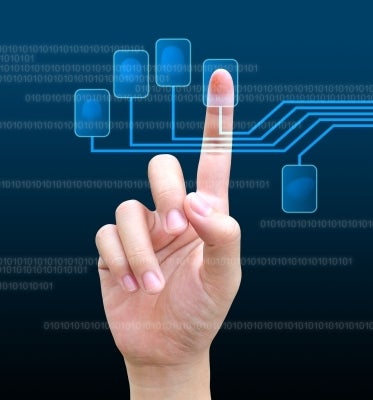Let’s say a worker has access to sensitive, confidential information, like the accounts of thousands of credit union members. How often should the worker change his or her password? Should it be 10 digits long and filled with numbers and random capitalization? And how can the credit union make sure they don’t share their log-in information with a coworker?
Today, Fitchburg-based Workers’ Credit Union has a lot less reason to worry about those questions. The 15-branch institution recently adopted a system that lets employees identify themselves, not with codes typed on keyboards, but with their own fingerprints.
The idea is to let workers, including those in the IT department, spend less time worrying about passwords, Dave Thibodeau, VP of information technology, said in a statement released by DigitalPersona, the maker of the identification system.
“It has also enhanced our security since the solution provides an audit trail that tells us who accesses what information,” he said.
Biometrics — the use of individual characteristics such as fingerprints, iris scans and voice to confirm a person’s identity — is familiar to many of us mostly from spy movies. But that seems likely to change fast, particularly with the recent release of Apple’s fingerprint-recognition technology on its iPhone 5. Toronto-based Biometrics Research Group Inc. has predicted that the global biometrics industry will grow from $7 billion in 2012 to $15 billion in 2015, with fingerprint technology making up half the total.
Paul Gentile, president of the Marlborough-based Massachusetts Credit Union League, said he’s heard of credit unions in other parts of the country adopting biometrics for their workers, but doesn’t think it’s a widespread trend within the state.
“I think Workers’ is a little leading-edge on this,” he said.
Lori Paxton, senior communications manager for DigitalPersona, said the company has more than 100 financial institutions similar to Workers’ among its customers, along with health care and retail businesses and government agencies.
“When you use biometrics you know who accesses what when,” she said. “You can’t say, ‘Oh, Sally must have borrowed my password.’”
Using a fingerprint to access a system is also quicker and easier than typing in a password, and it saves the IT department from having to reset passwords employees inevitably lose.
To some, having to provide a fingerprint to access computer systems might seem a bit like a science fiction-style invasion of privacy. But Paxton said that’s not the reaction the systems get.
“I would say almost 100 percent of the time, our customers say employees love it,” she said. “They like the ease. They like the accountability that somebody can’t blame them for something they didn’t do.” Paxton said one advantage of the system is that it never creates an image of workers’ fingerprints, instead building a mathematical footprint that can’t be reverse-engineered to recreate the print itself.
In any case, according to Bruce Spitzer, president of the Massachusetts Bankers Association, most people who work at financial institutions are already getting fingerprinted, with the prints kept on file as a precaution.
“For years, if you (have worked) in financial services and you handle money or have access to it, large institutions have been fingerprinting their employees,” he said. “That’s just the way it is if you want a job in financial services and you handle money.”
Spitzer said he’s not sure how many Massachusetts banks use biometric IDs for their employees, but he anticipates a more radical change, perhaps not far in the future: the technology’s use for customer identification.
“There is a general agreement that it may be in our future,” he said. “The technology is converging to the point where it may make sense.”
A fingerprint system could be used in conjunction with a card for extra security, Spitzer said. Or a teller window could include a facial recognition system to confirm a customer’s identity.
“A lot of this needs to be tested,” he said. “Customers need to be comfortable with it. It needs to be vetted for privacy.”
In fact, Paxton said, some companies are already using DigitalPersona’s system to confirm customers’ identities — just not in the U.S. She said two large Mexican companies use the company’s biometric IDs for customers as a way of working securely with people who don’t have bank accounts and debit cards.
Spitzer said there could be advantages, in both convenience and security, if the customer-facing use of the technology comes closer to home.
“We need to listen to our customers and understand what’s best for them,” he said.

